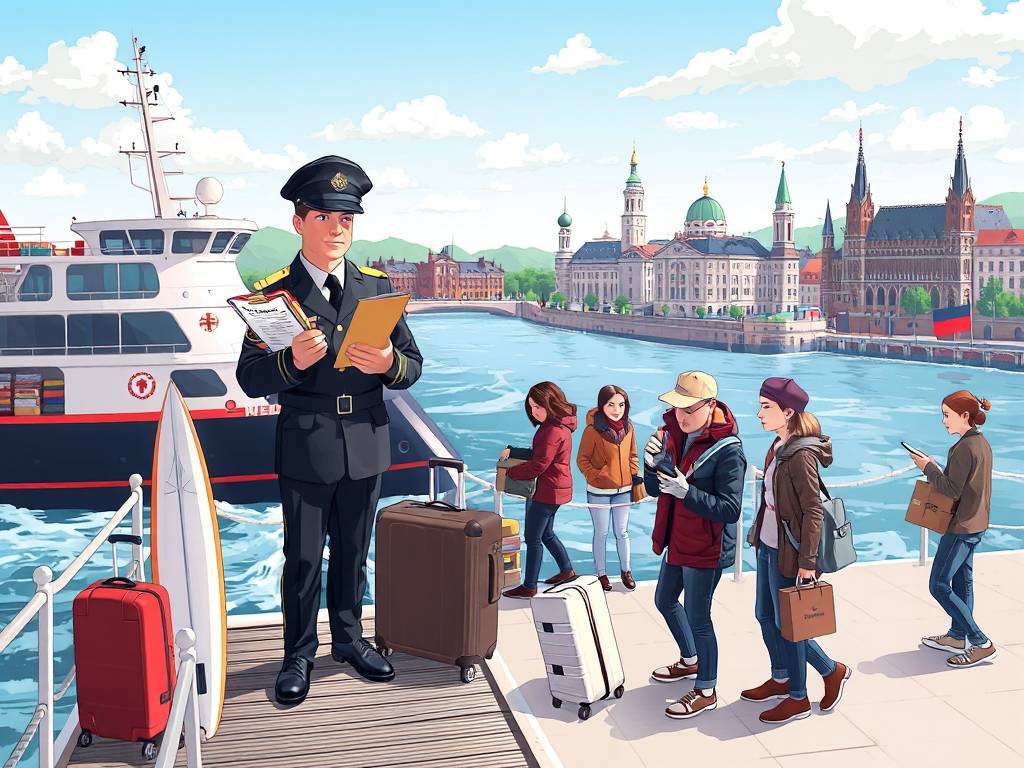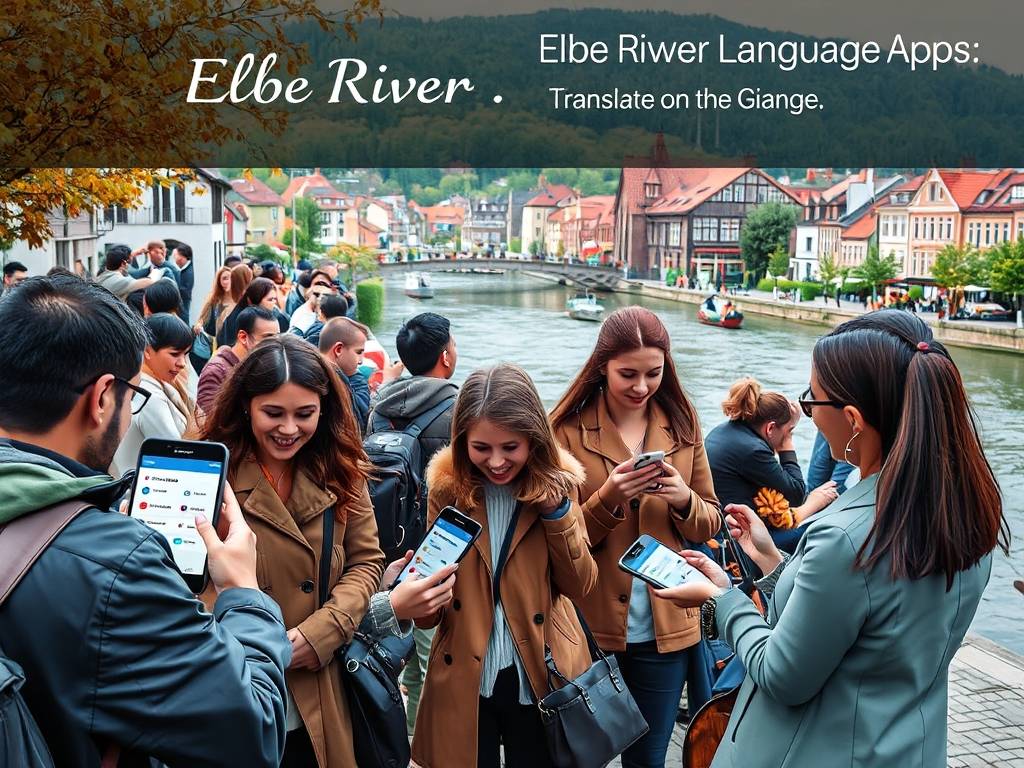Global Travel Information
Elbe River Customs Rules: What to Declare When Entering Germany
Navigating the Elbe: A Traveler's Guide to German Customs Declarations
So, you're planning a journey to Germany, and your path leads you along or across the majestic Elbe River. Whether you're arriving by cruise ship docking in Hamburg's bustling port, sailing a private yacht, or crossing a border bridge by train or car, the moment of entering a new country is always filled with anticipation. Part of that process, and one that often causes confusion, is understanding and complying with German customs regulations. The goal of this guide is to demystify exactly what you need to declare when entering Germany via the Elbe region, ensuring your arrival is as smooth and stress-free as the river's flow.
Let's be clear: customs rules aren't designed to trip up honest travelers. They exist to protect the country's economy, its citizens, and its environment. By knowing the rules, you're not only avoiding potential fines and delays but also contributing to the safety and well-being of your destination. The key principle is straightforward: you must declare certain goods, especially those that are restricted or that exceed duty-free allowances.

Understanding Your Point of Entry and Residency Status
First, it's crucial to distinguish your situation, as the rules differ significantly.
- Travelers from EU Countries: If you are arriving from another European Union member state (e.g., the Czech Republic, which the Elbe also flows through), you generally enjoy free movement of goods for personal use. This means there are no limits or duties on goods you bring with you, provided they are for your own consumption and not for commercial resale. However, there are still guidance levels for certain products like alcohol and tobacco to distinguish between personal and commercial quantities.
- Travelers from Non-EU Countries (Third Countries): This guide is primarily for you if you are arriving from outside the EU, such as the United States, Canada, the UK, Switzerland, Norway, or any other non-member state. The rules we will detail are based on the European Union's standard customs code for third-country arrivals.
The Duty-Free Allowances: What You Can Bring Without Declaring
For non-EU travelers, you can bring in certain goods up to a specific value without paying customs duty or tax. The most important figure to remember is 430 euros. This is the total value of goods you can bring in for personal use without needing to declare them if you are traveling by air or sea. If you are entering by land (e.g., by car or train), this allowance is 300 euros.
Within this overall allowance, there are specific limits for two popular categories:
- Tobacco Products: You can bring in, if you are 17 years or older:
- 200 cigarettes, or
- 100 cigarillos, or
- 50 cigars, or
- 250 grams of smoking tobacco.
- Alcoholic Beverages: You can bring in, if you are 17 years or older:
- 1 liter of spirits over 22% alcohol by volume, or
- 2 liters of intermediate products (e.g., fortified wine, port, sherry) up to 22% ABV.
- 4 liters of still wine, and
- 16 liters of beer.
It's vital to note that these tobacco and alcohol allowances are only available to travelers who have spent at least 48 hours outside the EU. If you exceed any of these limits in quantity or value, you must declare all items in that category, not just the excess.
The Red and Green Channels: The Moment of Truth
Upon arrival, you will typically encounter a system of channels, much like at an airport.

- The Green Channel ("Nothing to Declare"): Use this only if you are absolutely certain that all the goods you are carrying are within your personal duty-free allowances, are not restricted or prohibited, and that their total value is under the 430/300 euro limit.
- The Red Channel ("Goods to Declare"): You must use this channel if:
- You have goods that exceed your duty-free allowances.
- You are carrying commercial goods (i.e., items for sale).
- You are carrying more than 10,000 euros (or equivalent in other currencies) in cash or negotiable instruments.
- You have any restricted or prohibited items (which we'll cover next).
When in doubt, always choose the Red Channel. It is far better to be honest and potentially pay a small duty than to be caught with undeclared goods, which can lead to severe penalties, including heavy fines and confiscation of the items.
What Must Be Declared: A Detailed Look at Restricted and Prohibited Items
This is the core of German customs rules. Even if an item is within your value allowance, it may still need to be declared or is outright forbidden.
-
Cash and Equivalent Assets: This is a critical and often overlooked rule. If you are carrying cash or securities valued at 10,000 euros or more, you must declare it to the customs authorities using a specific form. This is not a tax; it's a measure to combat money laundering and terrorist financing. Failure to declare can result in significant fines.
-
Medicines: You are permitted to bring medicines for personal use. However, it is highly recommended to carry them in their original packaging and to have a copy of the doctor's prescription or a letter from your physician, especially for controlled substances or injectable medicines. For certain potent medications, there may be quantity limits, so checking with the German embassy beforehand is wise.
-
Foods of Animal Origin (Meat, Dairy, etc.): Strict regulations govern the import of food products from outside the EU. Generally, the import of meat, milk, and their products is prohibited. There are limited exceptions for certain quantities of powdered infant milk, infant food, and special foods required for medical reasons. The rules are complex and aimed at preventing the spread of animal diseases, so it is safest to assume that you cannot bring in fresh or packaged meats and most dairy products.
-
Plants and Plant Products: Similar to food, there are strict controls. You need a phytosanitary certificate for many plants, seeds, and cut flowers. For the average traveler, it's best to avoid bringing these items altogether to prevent the introduction of pests and diseases.
-
Endangered Species (CITES): Products made from endangered species are strictly regulated or banned. This includes ivory, tortoiseshell, reptile leather, certain furs, and traditional medicines containing parts of protected animals like tigers or rhinos. If you have an item that you think might fall under this category, you must declare it and provide the necessary CITES permits. Without them, the item will be confiscated.
-
Weapons, Ammunition, and Imitations: These are subject to stringent controls. You must have a valid European Firearm Pass or equivalent permission. Realistic imitation weapons are also often prohibited.
-
Cultural Goods and Antiquities: If you are carrying items of significant cultural, historical, or archaeological value, you may need an export license from the country of origin. German customs will check for this to prevent the illicit trade of cultural property.
Practical Scenarios for Elbe River Travelers
Let's apply these rules to common situations:
- The Cruise Ship Passenger in Hamburg: You bought a €500 watch in Norway and have two liters of spirits. You must declare the watch as its value exceeds the €430 allowance. The alcohol is within the limit, but because you are declaring one item, you must declare everything.
- The Private Yachtsman from the UK: You have £9,000 and €4,000 in cash on board. This totals well over €10,000. You must complete a cash declaration form upon arrival.
- The Road Tripper from the Czech Republic: You have 5 liters of Czech beer and some local cheeses. As you're traveling from within the EU, these are generally fine for personal use.
Final Tips for a Hassle-Free Entry
- Keep Receipts: For new or expensive items you are carrying, especially those purchased on your trip, keep the sales receipts handy. This helps prove their value.
- Pack Smartly: Keep items you are unsure about easily accessible. Don't pack declared items deep within checked luggage.
- Be Honest and Polite: Customs officers are doing their job. Answer their questions clearly and honestly. Transparency is your best policy.
- When in Doubt, Declare: This cannot be overstated. The "declare" principle is the safest approach to German customs clearance.
Navigating the Elbe River customs rules doesn't have to be a daunting voyage. By understanding your allowances, knowing what is restricted, and embracing the simple rule of declaring anything you're unsure about, you can ensure that your first steps in Germany are filled with excitement for the journey ahead, not anxiety about the rules behind you. Welcome to Germany
相关文章
- Elbe River Visa Information: Requirements for International Travelers
- Elbe River Passport Tips: Keep Your Documents Safe
- Elbe River Language Apps: Translate on the Go
- Elbe River Wi-Fi Spots: Stay Connected Along the River
- Elbe River Power Outlets: Charging Tips for Devices
- Elbe River Travel Blogs: Read Other Visitors’ Experiences
- Elbe River Travel Vlogs: Watch Videos of the Waterway
- Elbe River Social Media Hashtags: Share Your Photos
- Elbe River Online Communities: Connect with Fellow Travelers
- Elbe River Travel Forums: Ask Questions & Get Advice
发表评论
评论列表
- 这篇文章还没有收到评论,赶紧来抢沙发吧~


